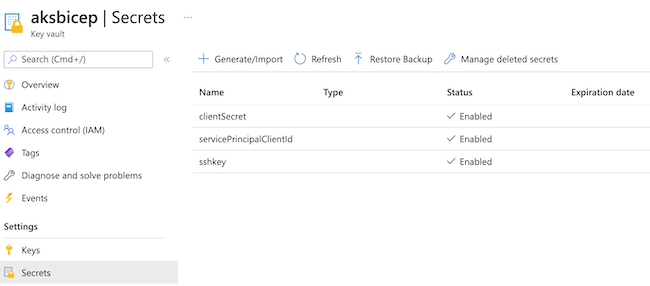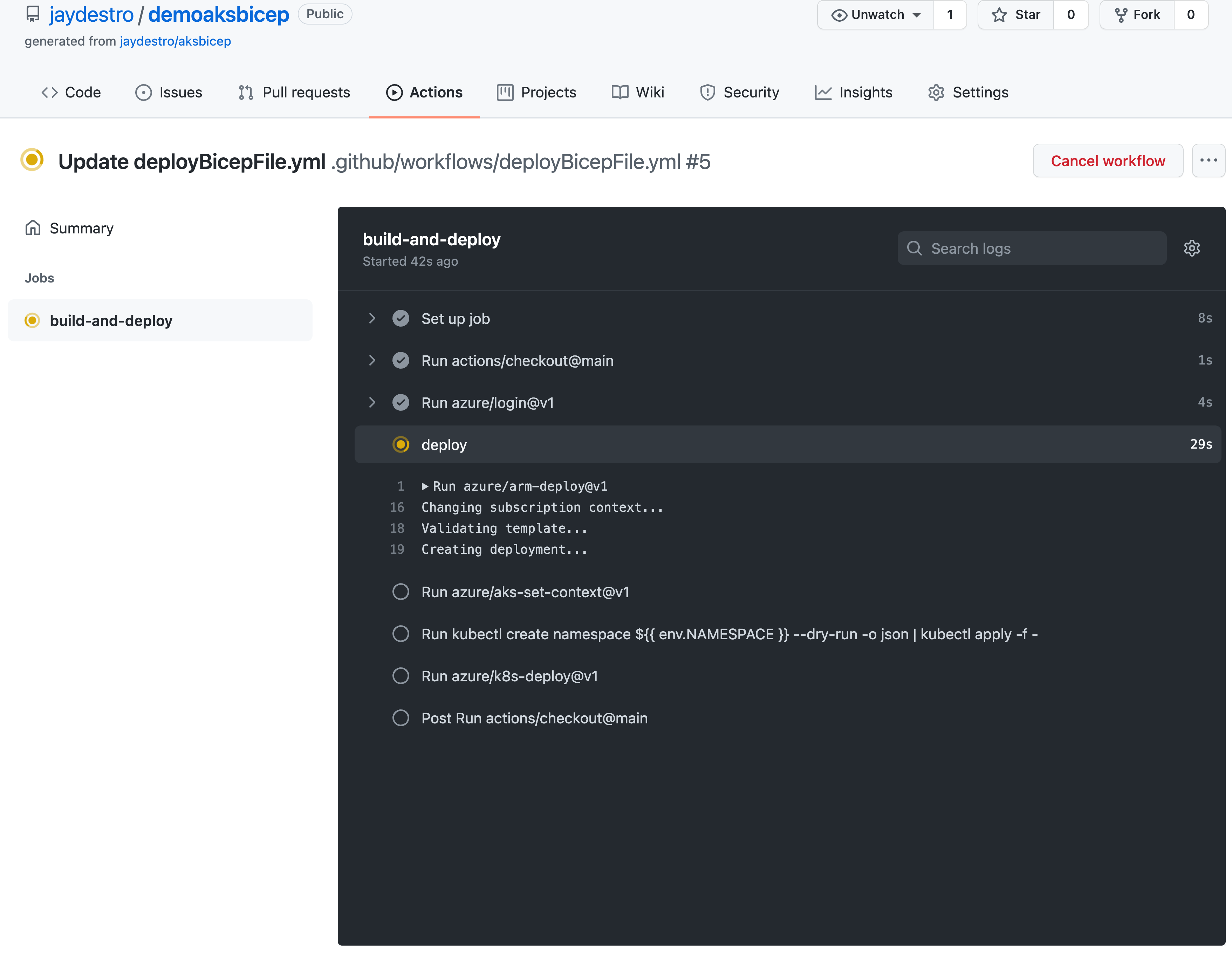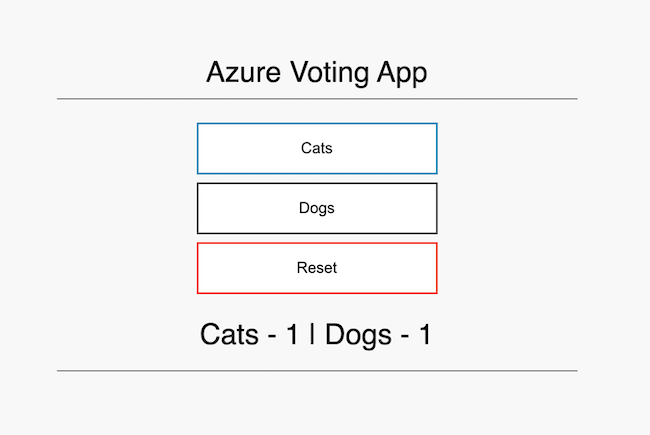aksbicep
An example to create an AKS cluster with secrets from Azure Key Vault with Bicep and GitHub actions. Once the cluster is created, the workflow will apply manifests/deployment.yml that's a pre-created image.
Bicep is a domain-specific language (DSL) that uses declarative syntax to deploy Azure resources. It provides concise syntax, reliable type safety, and support for code reuse. We believe Bicep offers the best authoring experience for your infrastructure-as-code solutions in Azure.
GitHub Actions helps you automate your software development workflows from within GitHub. You can deploy workflows in the same place where you store code and collaborate on pull requests and issues.
Azure Key Vault protects cryptographic keys, certificates (and the private keys associated with the certificates), and secrets (such as connection strings and passwords) in the cloud.
Azure Kubernetes Service Easily define, deploy, debug, and upgrade even the most complex Kubernetes applications, and automatically containerize your applications. Use modern application development to accelerate time to market.
Pre-requisites
-
An SSH public key.
-
Fork this repository so you can run GitHub Actions
-
Clone the fork locally or in your Azure Cloud Shell.
Deployment
- Create a unique Azure Resource Group. We're using this as a paramater for several portions of the workshop, so please ensure the name is unique. For example
aksbicepjagord01
az group create -n <rg name> --location <region>
- Get your subscription ID
az account list --query "[?isDefault]"
- Follow the "Generate deployment credentials" and "Configure the GitHub secrets" of this guide.
az ad sp create-for-rbac --name {myApp} --role contributor --scopes /subscriptions/{subscription-id}/resourceGroups/{MyResourceGroup} --sdk-auth
-
Create secrets in the repo for
AZURE_CREDENTIALS,AZURE_RG, andAZURE_SUBSCRIPTIONto connect your Azure account to the GitHub repo for actions to run OR use the CLI command below to create the required service principal. -
-
Click Create at top of resource group
-
Search for Key Vault
-
Click Create
-
Give a unique name in the Key vault name section
-
Click to "Access Policy" section and select the three tick boxes:
✔️ Azure Virtual Machines for deployment ✔️ Azure Resource Manager for template deployment ✔️ Azure Disk Encryption for volume encryption -
Leave the rest as default
-
Click Review and Create
-
-
Store your credentials as secrets
sshRSAPublicKey,servicePrincipalClientId, andservicePrincipalClientSecretThese secrets will have your SSH keys to access the cluster nodes for troubleshooting and your Service Principal credentials.
- Create a secret to store
sshRSAPublicKey- Go to your key vault
- Click Secrets
- Click Generate/Import
- Create secret:
- Name: sshRSAPublicKey
- Value: output of your ssh key
- Click create
- Repeat steps for
servicePrincipalClientIdandservicePrincipalClientSecret
- Create a secret to store
- Update azuredeploy.parameters.json with the name of your resource group to
uniqueclustername,dnsPrefix.
Update the sshRSAPublicKey, servicePrincipalClientId, and servicePrincipalClientSecret details:
To let your template reference KeyVault secrets from parameters, update the id to point to the KeyVault you created earlier.
"id": "/subscriptions/{subscriptionID}/resourceGroups/{resource group}/providers/Microsoft.KeyVault/vaults/{keyvault name}"Finally the manifests/deployment.yml file is loaded which provides you with the Azure Voting App, a Python/Flask app with Redis as your data component. You do not need to make any changes here.
When you commit to the main branch, it will kick off a build. You'll get an AKS cluster with a service principal. You can add custom names and features to the parameters file.
To access your public IP from the loadbalancer:
az aks get-credentials --name <resource group name> --resource group <resource group name>
kubectl get services --all-namespacesYour output should be something like this:
NAMESPACE NAME TYPE CLUSTER-IP EXTERNAL-IP PORT(S) AGE
default kubernetes ClusterIP 10.0.0.1 <none> 443/TCP 47h
kube-system healthmodel-replicaset-service ClusterIP 10.0.228.13 <none> 25227/TCP 47h
kube-system kube-dns ClusterIP 10.0.0.10 <none> 53/UDP,53/TCP 47h
kube-system metrics-server ClusterIP 10.0.212.100 <none> 443/TCP 47h
voteappprod azure-vote-back ClusterIP 10.0.62.6 <none> 6379/TCP 47h
voteappprod azure-vote-front LoadBalancer 10.0.19.38 1.2.3.4 80:30305/TCP 47h



